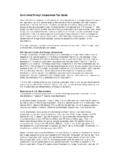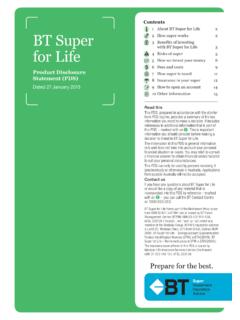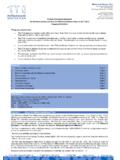Transcription of Personal Holding Companies - AVC ADVISORY
1 Five sections of the IRS tax code cause the most problems for taxpayers and tax planners. They concern: 1) Controlled Foreign Corporations 2) Personal Holding Companies 3) Foreign Personal Holding Companies 4) Foreign Investment Companies , and 5) Companies subject to the Accumulated Earnings Tax. This paper discusses each of these sections, excluding the Controlled Foreign Corporation. Personal Holding Companies A corporation is a Personal Holding Company if at any time during the last half of the taxable year more than 50% in value of its outstanding stock is owned, directly or indirectly, by no more than 5 individuals. In addition, at least 60% of the corporation s "adjusted ordinary gross income" must consist of passive investment income (dividends, interest). When computing the Personal Holding company's taxable income several adjustments are allowed. Net long term capital gains are excluded, the "regular income tax paid is deducted, and the 80% dividends-received deduction is added back.
2 The FPHC tax applies to the shareholders of the foreign company. The Personal Holding company tax is levied against the foreign company itself. The PHC tax is and is imposed on the undistributed Personal Holding company income. The tax applies to foreign and domestic Companies alike, and is in addition to the regular corporate Banks, insurance Companies , foreign Personal Holding Companies and passive foreign investment Companies are not subject to the PHC tax. Foreign Personal Holding Company Congress enacted Foreign Personal Holding Company provisions in 1937 to curb the abusive use of foreign corporations for strictly tax avoidance purposes. If FPHC provisions apply the United States shareholders of the company will be taxable on t heir pro-rated share of the undistributed FPHC Income. A Foreign Personal Holding Company is any foreign corporation whose gross income consists of dividends, interests, royalties, annuities, gains from the sale of stock or securities, certain rents, and moneys received under Personal service contracts in such amounts so as to exceed 60% of all company earnings, and whose shares are held by no fewer than 5 Individuals who together hold more than 50% of either the value or voting stock outstanding.
3 For the FPHC provisions to apply, both the gross income test (IRC 552(a)1) and the stock ownership test (IRC 552(a)(2) must be breached. The FPHC tax seldom applies because planners take whatever remedy they have at their disposal to avoid it. For example, a foreign corporation could move its FPHC assets (stocks, bonds and other FPHC items) into a foreign trust. This would insulate the foreign company from the FPHC status by reducing its FPHC income to a safe level. Another legal way to avoid the FPHC problem is to distribute as a dividend the undistributed FPHC income to the shareholders. IRC 561 (a) allows the foreign corporation to deduct the dividends paid during !he taxable year when computing its FPHC Income. Still, another avenue available to avoid FPHC status is satisfying the stock ownership tests of IRC 552(a)(2). Stock Ownership Tests For a foreign corporation to be considered a FPHC more than 50% of either its voting power or value of its outstanding stock must be owned, directly or indirectly, by no more than 5 individual citizens or residents (called the United States Group by the Code).)
4 IRC 554(a) provides that shares can be attributed to an individual from his family, thus a shareholder can constructively own more shares then he actually owns Gross Income Test When a foreign corporation's gross income consists of at least 60% of passive type incomes (interest, dividends, capital gains, royalties), it is said that the company has FPHC income. When arriving at the 60% threshold, no distinction is made between foreign source income and source income. Both types are counted when adding up the taxable amount to be included in the gross income of the shareholder(s). It should be pointed out, the shareholder is taxable on the FPHC income of a foreign corporation that is undistributed to him , thus the shareholder pays a current tax, even though he has not received the income from the FPHC and later may be taxed again on the withdrawn and paid by the foreign company. This is double taxation of profits at its zenith.
5 Undistributed FPHC Income Tax relief from the FPHC penalty can be obtained by distributing as a dividend undistributed FPHC income to shareholders. Unfortunately, if your goal is to accumulate profits offshore in a no-tax haven, you'll not want to distribute your profits every year. Foreign Investment Company Like the Controlled Foreign Corporation legislation, the foreign investment company provisions were enacted with the Revenue Act of 1962 during the Kennedy Administration. Its aim was to send more tax dollars to the Treasury, in this case at the expense of the shareholders by restricting the use of foreign corporations as strictly passive investment vehicles. By converting long term capital gains on the sale of foreign investment company stock into ordinary income, taxable at a higher tax rate. the shareholder was penalized for investing outside the United States. This section of the tax law was temporarily nullified the effectiveness of the Foreign Investment Company (PIC) legislation by the Tax Reform Act of 1986 because for years after July 1, 1987 capital gains were taxed as ordinary income anyway.
6 To make up for this unintended windfall to the taxpayer, Congress legislated new rules to augment the suddenly ineffective PIC provisions. This new legislation is the Passive Foreign Investment Company provisions of IRC 1291 to 1297. When the Bush Administration restored a lower capital gains tax rate brought the dormant FIC provisions back to life, as the FIC provisions of IRC 1246 were never repealed. Passive Foreign Investment Companies Under current tax law, capital gains (except for certain real estate gains) of a non-resident alien company, trust or individual are exempted from tax under IRC 881 and IRC 871. Thus, the stock and bond capital gains of foreign mutual funds often go 100% tax free. To discourage citizens from investing in offshore mutual funds that generate passive incomes ( , capital gains, interest, dividends, royalties), yet pay little or no taxes in the host country where they are organized (effectively deferring taxes for their shareholders until the profits are distributed), Congress enacted the PFIC provisions.
7 The Tax Reform Act of 1986 added new Code-sections 1291 thru 1297 for PFICs. With the removal of the favourable tax treatment for long term capital gains by the TRA of 1986, foreign investment Companies would be doubly attractive to the investor, because investor could defer his Federal income liability indefinitely by simply choosing a foreign fund or unit trust over a comparable domestic mutual fund. Since the IRS cannot tax the profits of a foreign investment company domiciled in foreign countries like the Channel Islands, the Caymans, Bermuda or the Bahamas, because the IRS' jurisdiction is limited to entities organized within United States, offshore foreign funds are paying no taxes to the Treasury. Passive Foreign Investment Companies - Defined Not all offshore Companies organized in tax havens will be PFICs. A foreign corporation is a PFIC only if 75% or more of its gross income for the tax year is passive income, or at least 50% of the average value of its assets produce or are held for the production of passive income.
8 Passive Income is defined under IRC 904(d)(2)(A) and includes dividends, interests, passive rents (but not rents from unrelated parties), royalties, annuities, gains from the disposition of stocks and bonds, commodity trading gains, and currency gains. Passive income does not include manufacturing profits, most service related incomes, and rents from unrelated parties. Under these rules, the gain recognized by the shareholder on the disposition of PFIC stock, or on the receipt of an excess distribution ( dividends) from a PFIC, is considered earned pro-rata over the shareholder s Holding period and is treated as ordinary income and taxed at the taxpayer s highest rate of tax applicable o the tax year which it is allocated. This super tax is then increased by an interest charge for underpayment. While persons are subjected to these rules, a noon-resident alien or foreigner would not be. In effect, the PFIC rules wipe-out the tax deferral, including accumulated profits for persons.
9 Accumulate Earnings Tax The Accumulated Earnings Tax (AET) of IRC 532(a) is applicable to foreign corporations (but not foreign trusts) which were formed for avoiding tax with respect to its shareholders by allowing earnings and profits to accumulate, instead of being distributed as a taxable dividend to the shareholders. The AET applies to domestic and foreign corporations, but only income that has a source is considered when determining the tax. The tax under President Clinton's Revenue Reconciliation Act of 1993 is The AET can be avoided if the foreign corporation passes a dividend equal to the accumulated taxable income.




